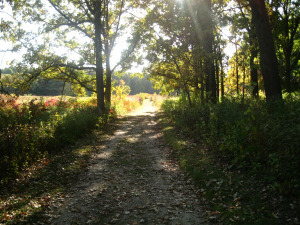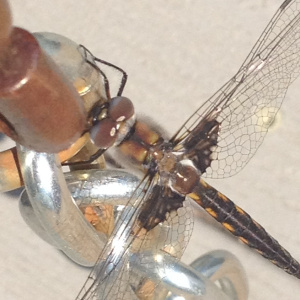A.R. Jarvis's Blog, page 4
August 27, 2015
SSBB #56 Out of This World
PHOTO OF SOMETHING IMPRESSIVE. Or of a flower.
It’s time for a new Shousetsu Bang*Bang! Whoooooo!!! What a great thing to add to my To Read List; and a great thing that gets to go right to the top of the pile. Because nothing stands in the way of gay pr0n around here (And I don’t even know if that’s sarcastic, so you’re in good company).
This was a great set of stories! I don’t think there was even one that I felt mostly-neutral feels over. There was at least one that I wasn’t squeeing myself over, but my feels were still mostly positive with it. I even read most of the smut!
As a musing side-note, it seems like gay sci-fi is much less common than gay fantasy, yet when I do find it, it always seems to be really good. I’ve run across exceptions to that, sure, but whenever I have a hankering for good gay sci-fi, I can just stumble on some, but when I want good gay fantasy, I usually have to trudge through three or four things looking for it.
But maybe it’s observation bias, who knows?
Anyway, as you can guess, this issue was themed Out of this World, which all of the stories did very nicely, and all with a sci-fi lens, save the very last, which looked at different worlds somewhat closer to home.
Delroy Pitt’s From Outer Space, by Hiwaru Kibi: A trucker is accosted on the highway by two men in silver paint, maybe. He is taken to their spaceship for some anal probing, of course. And then there’s the armadillo…
Fubar at Achernar Station, by Hyakunichisou 13: I didn’t think it was exactly FUBAR, but I guess, since this is sci-fi, that some leeway can be granted the term by considering that its meaning may have shifted over the “years.” A precog of intermittent ability is given a mark, but the mark gets arrested by another guy, and the precog needs to decide what to do.
The Wild Black Yonder, by Iron Eater: A mechanic who stays on station, and the cybernetically-enhanced pilot who calls him “Boss.” Two parts. A few mild twists, nothing too fancy, plot-wise.
Hazy Cosmic Jive, by Renaissance Makoto J: The weirdest, most wonderful sci-fi story I have ever me. From the first squirrel, through all the invasions, past the grubs, and right out into outer space.
Queen Zahr’s Revenge, by Matsu Kasumi: Tentacle porn. In a good way. No, no, in the best way.
Collide, by loveonthefarm: Two parts. A young human gets accepted to host a Visitor from another planet. This was an absolutely beautifully written piece. It felt like I was reading an oil painting (the Renaissance sort, not the Pollock sort), and was just wonderfully scrumptious. Which made up for the fact that it felt weirdly one-sided. Like I was just so happy to be floating around in Guy A’s head, that I barely realized that we hardly knew what Guy B was thinking (even in a third-person-limited sense we were limited).
Flowers in the Jungle, by Riba: A really asshole husband, and his xenoanthropologist wife study a very unusual species. May have some mild consent considerations, but really the guy is enough of an asshole (and it’s dub-con enough) that you mostly don’t care (like he’s into it, but might be pretending not to be into it, just so he can later say he wasn’t into it…basically, he’s an asshole). Also, pussy-flowers.
Smuggling, and How to Make Interstellar Exploration Work For You, by Aosora Hikaru: This one seemed familiar, though I couldn’t place the characters specifically. A cargo captain and his partner get a smuggling job offer which will lead them to confront past demons, and possibly save a whole star-system from destruction. This was a good story, but …doesn’t quite live up to the potential of its brief summary, if you will (the conclusion was on the too easy side)
Night Begins the Day, by shukyou: A fantastic novella (two parts) about a Jewish young man and a young man who is simply Jew-ish, and how they might, maybe, make things work. A great look at how things can be out of this world, even when they are still here on Earth.


August 4, 2015
The Best American Science and Nature Writing 2014
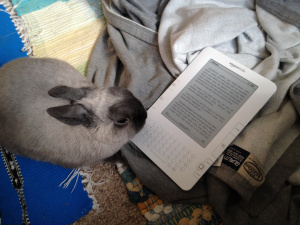
Guess what she prefers
The Best Science and Nature Writing books are generally correctly named, and the 2014 edition (edited by Deborah Blum) was no exception.
Basically someone with more time and …well, probably they are paid for it, but they locate and collect the Best articles on the topic of the year, from various magazine-like sources, and then combine them into one wonderful volume. Usually there’s one article that I’m not enamored of, but I think I read all of them this year, and generally with glee.
Except for the one called “Why the Brain Prefers Paper” by Ferris Jabr. That one annoyed me greatly. Not because it was bad, no no, I’m upset over the principle of the thing.
There’s a lot of …sentiment going around saying that reading ebooks is a horrible thing, that’s ruining our memory, our ability to read long-form, our talent for processing facts, and probably our critical thinking skills.
Now, I’m not saying ebooks are perfect, but I would argue that the science I’ve so far seen presented about how Evil they are is…unconvincing, and that for a number of reasons. First, a lot of these studies are small; 50-75 people, one study, results not replicated (yet?). Second, there are a lot of variables unaccounted for; are the ebook-people used to reading on screens? What sort did they read on? was it on a monitor or e-ink? Third, many of these articles conflate reading ebooks with reading “news” articles online; lots of ads distracting in the background, ect. Fourth, when the comparisons are done for children’s books, they are generally “old school” vs. interactive almost-game ebooks, which is nothing like a fair comparison (one seemed to be those battery-powered noise-making-button-pushing [in so many ways] books vs. “old school” paper ones, which is not even a little bit like an actual ebook). And last, they tend to neglect the roll adding features– like, say…a better progress bar– would play; like “People will NEVER be able to find a lost page in an ebook! Quel horror! End this travesty now!”
So you get results like people reading a .pdf on a computer (LCD? CRT?) screen have a harder time remembering the information gleaned as separate from the experience of reading it vs. from students who read the article on paper (which, okay, .pdfs are awful in almost every situation). Or fifty people read a book on either paper or ebook, and then the ebook people had a harder time remembering the order of events in the story they read (but was it a kindle fire? was it a webpage? was it an actual e-ink reader? Was this the first time they’d read an ebook?). Or people tend to get distracted by links and videos and ads when reading electric sources (…that’s not a fucking ebook, dumbass). And parents prefer to read a paper book with their child over one with distracting buttons (oh fuck yes, I don’t even let my students lift-the-flaps in books when I’m reading those …but I’ve read them ebooks on my tablet with no stress).
I want to see studies done where it’s e-ink with a progress bar vs. without. Where it’s a pop-up book vs. an interactive kids’ ebook, or a normal paper picture book vs. a simple ebook version of the same one. Where it’s reading an article from one of those horrible teen mags where you can’t tell what’s content and what’s article in the paper version vs. reading it online (with neither mistaken as an ebook). And I’d like to see all of this implemented as useful development tools for where to put ads when you want people to read your thing, or what to add to an ebook reader to make it more like a paper experience (and Amazon should know I have some suggestions…), or used to write a book about how to teach your child to focus.
Because so far, the take-away that I have from these articles is that we need a way to feel our “place” in a book that is more consistent, visible, and useful than a progress percentage you have to tap to find. And also that it is really fucking difficult to flip back (or forth) through an ebook, which, to be honest, I’m not sure that you can change easily. And otherwise we’re just a bunch of sticks-in-the-mud who don’t want to change or adapt, and feel that anything new must be despised.
I like to imagine that as writing (as opposed to oral story telling) came into vogue, there were lots of communal debates and lectures about how it was ruining memory, making stories inaccessible, causing readers to engage with the tales less, and so forth. Lectures that we probably don’t have any record of, because, well…for obvious reasons, they weren’t written down. And I think that in a few decades, our children will squint at these articles in confusion, and shake their heads at the foibles of the past.
It was also ironic that I read the article on e-ink. But it’s all okay, because having read it on a screen, I’ll probably forget the whole thing in a wee–oh, wait, no, I finished the whole book a week ago, and I’m still incensed by the whole thing. Huh. Fancy that.


July 21, 2015
Circus Maximus: SSBB Yes, And #3
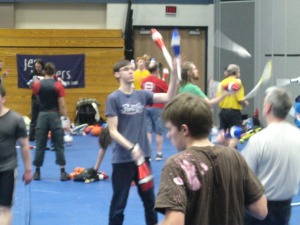
Circus?! Do I have a shitty picture from Juggling Fest to use? You bet I do!
Circus Maximus is Shousetsu Bang*Bang’s third issue of their Yes, And edition. Usually SSBB is male/male smut only, but twice a year they open the doors a bit, once for their female/female edition, which I faithfully do not read, and once a year for their anything-goes Yes, And edition.
You can maybe guess from that statement that I’m one of those…those people who don’t read the lady-love as all-consumingly as I read the M/M stuff. And it’s true. I don’t turn away from it if I happen upon it, but it’s just not really my boat. But anyway, enough about be being an asshole. This isn’t the Girls Club edition, but rather the What the Fuck Did I Just Read? edition. In a good way. Mostly.
A Sucker Born Every Minute (and Three on the Doorstep), by Yin Twig: A guy “wins” the chance to have his greatest wish come true, and three circus men appear to try and make that happen. They manage to both succeed and fail at the same time. Features a transgender character (FTM).
Private Show, by Auriel Naughtwell: The leader of the circus and the leader’s two lovers after the show. I realize that pronouns are a loaded topic in this issue, but I was especially confused about who was …I mean, I know who was what (inasmuch as we’re supposed to know), but I guess what they were doing was…I just spent most of this story really, really confused, until the sex started and I just skimmed to get the gist of it.
Kaleidoscope, by Sparklebeard: An intriguing snapshot of an inter-species relationship with one human, and one alien of a sort that’s really turned on just by colors.
Suspension, by shukyou: This one had maybe the most interesting gender angle, wherein everyone was considered to be a woman until you wanted to sleep with him, at which point he became a man. So two women who are friends meet a man, and all three men have a pretty hot threesome, which does not include three cocks.
International Dissertation Avoidance Day, by Kimyō Tabibito: Some guy writing his dissertation gets distracted by their roommate discovering it was National Fisting Day. I believe the MC is trans? It was a decent, if not terribly memorable, story.
The Bearded Girl and the Silksmith, by Mar Gyorin: This was the only 2-part story. I did not get that far. And I don’t think my intolerable confusion can be blamed only on poor pronoun choices this time, either. I stopped somewhere around when it began to seem like someone was missing fingers? Not because they were missing fingers, but because I hadn’t a flippity-fucking clue what was going on.
Long Distance, by Iron Eater: This was a clever one about a…something that joins an interdimensional dating website, and then goes on a couple of dates with a human, even though that human uses their mouth for all sorts of things, and not just eating.
You Just Might Get It, by juou no zen: A couple goes to dinner with the wife’s old girlfriend, and then two of them end up acting out the fantasies of the third. I might say this was the hottest of the bunch, even if I’m not usually into the ladies.
The Funambulist, by Hikaru Yamaguchi: A guy goes to meet up with his friend who works in the circus, and there meets a certain someone…and then again the ….you know, this isn’t one I can describe while being coy. Man. Goes to circus. Lusts after contortionist. Sleeps with contortionist. Returns to circus. Meets a card magician. Lusts after magician. A good read.
Ludi, by Rin Katta: This was set in Rome? But more modern Rome? Because they had electric lights, but still had chariot races. It was…interesting. Another FTM, but without anything like surgery to aid in the transition. But the writing was a little on the confusing side again. Or maybe it was just getting late, I don’t know.
The Queen’s Dancing Girl, by Reddoraion no ōjo: A queen and her lover role play with their favorite dancing girl and slut. I’m not sure I liked the language they used with the girl, but she didn’t seem to mind. And maybe it’s just that I’m not used to seeing those terms used?
An unexpected stay in Highbridge Town, by Hyakunichisou 13: A traveling circus’ road is washed out, forcing them to stay in Highbridge town longer than they’d planned. But while they are there strange things start to happen. Very strange things, indeed.


July 19, 2015
Packing for Mars by Mary Roach

Maybe I should make one of Mars?
You may recall my less-than-stellar review of Spook, and that at the end I was a little nervous about reading Packing for Mars, since it’s also by Mary Roach. But I am very pleased to say that Packing for Mars is way, way better. I even stayed up late to finish it last night! It could just be that the topic was one more interesting to me, or that I had adjusted to her style more, but I really do think this was simply better written.
Packing for Mars is about the strange and silly details that go into consideration when gravity is out of the equation. So there was a lot about bodily functions. Which is not surprising at all, since I’m pretty sure everyone’s always wondered how they shit in space (and now I know).
I do have a few gripes about the book; Mary Roach repeated a few things. At least one was a reintroduction of a topic, which included a cheery “as we learned and probably forgot in Chapter 4…” And a few others were nods to the fact that we’d already learned it, but it’s complicated, so we should probably learn it again. But then there was the water tank at NASA which has bits of the space ships assembled in it for practice, which was mentioned at least three separate times, and introduced like it was an entirely new idea each time. I don’t think I can hold it against the author, who probably wrote the chapters with enough time between them to forget that she’d already talked about that, but by the third explanation it was pretty annoying.
And…no that…well. A gripe I have in general about non-fiction writing is that it often jumps around from topic to topic, and then back, and then on a tangent, and then into a metaphor, which ties back to the first point, which you may or may not have forgotten by now. This was one of the issues in Spook (although I may not have addressed it in my review). And it was still present in this book, but to a much lesser extent. So I guess that’s more of a compliment than a gripe? That Mary Roach did a better job staying on-subject than previously experienced.
But like I said, this book was a really good read, full of interesting stuff (especially if you want to know about personal hygiene in outer space). It’s a wee bit dated (from 2010-ish), but only in the sense that you should add at least an extra decade onto every anticipated-date of a future project. No moonbase in 2015, for example. And I don’t think we’re still on track for Mars in 2035.
But we did fly by Pluto, and that’s fantastic, if completely unrelated.


July 12, 2015
Spook: Science Tackles the Afterlife by Mary Roach
The last non-fiction book I read, of course, was The Mapmakers, and it took me forever and a half, so I was a bit reluctant to read another non-fiction book this soon. But I knew this one would be lighter, so I went with it anyway. And I was not disappointed. Spook: Science Tackles the Afterlife by Mary Roach is quite informative, and a fast read.
I’ve heard good things about Mary Roach before, but I had yet to get around to reading something by her, and the Goodreads average rating was lowish on Spook, thus it was with some trepidation that I began this book. It’s premised by her saying that she’s neither skeptic nor spiritualist, but merely a curious researcher in the name of science. She also said that the book was supposed to be light-hearted in tone, which it mostly was, although sometimes I found her footnotes and clever comments slightly annoying (I hope they will be lessened as her writing improves over time; this is only her second book).
Despite my misgivings, I concluded that the low GR average is probably due to the topic, and the fact that she sees herself on neither side of the typical argument, which probably just pissed off everyone, rather than opening the discussion.
Gah, sorry, I feel really inarticulate this evening, and I’m having a hard time organizing my thoughts about this book.
It covers many topics including rebirth (and children remembering their past lives), the physical search for the soul in the body, several famous mediums, ectoplasm, the roles of technology in both proving and disproving spirits, and near death experiences. Each topic was covered (as best as possible) from the distant past through to the present, and what modern science is discovering about it.
And most of the topics came across as unbelievable, even when M. Roach tried to keep an open mind. This is fine by me, I’m pretty skeptical about it all. Actually, if anything, I thought she was a bit too soft on some of the people she spoke of.
But there was something about her writing, most especially when she would drift back and forth in time, which left me occasionally confused. Perhaps because there was too much personal narrative worked into the overall storyline? Or perhaps just because my brain does not like dates all that much.
So…I don’t even know if that’s enough…I don’t even know if that’s coherent. Let’s blame the heat. But anyway, it was a decent read, I enjoyed learning the things that it contained, I wasn’t completely put off by any of the style issues (just disappointed), and I already have another book by Mary Roach lined up to read; Packing for Mars.


July 6, 2015
A Charm of Magpies Series by KJ Charles
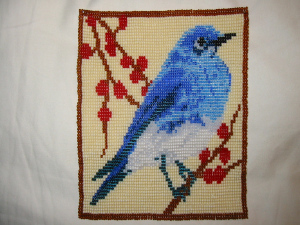
It’s this or a robin; I don’t have many pictures of birds
I didn’t just read The Mapmakers and SSBB this past interim, though. I also found The Magpie Lord hanging out on my kindle, and decided to give it a try. And then liked it so much that I went and got the sequels; A Case of Possession, and Flight of Magpies. Plus two short side-stories: A Case of Spirits and Interlude with Tattoos. There’s another short story that I haven’t gotten to yet, and also I think there’s another book that’s supposed to be set in the same world–Jackdaw, maybe? And while the series is nicely wrapped up, it is also open to another potential sequel, which I would read in a heartbeat (a declaration that doesn’t explain why I haven’t read the third short, however).
I liked the whole series, which, of course, always makes it difficult to review.
The world is a Period-England setting with Supernatural Elements, because that’s a Thing these days, but it’s a pretty solid such setting. I believe the author is actually from England, so there’s an extra hint of reality with all the details (the ones that are lacking when the author has only taken England 101 at Hollywood Kollege). And some parts of the magic system seem to have been built as-needed by the plot, but it still works out nicely in the end (nothing painfully grafted on a previously detailed explanation or anything).
And now I have to confess that I read the books almost two weeks ago, and thus recall very little about the writing style or story-telling craft. Which probably means they were both good or fantastic, because if something bugs me, I remember. I can say assertively that the story-crafting grows with the series; there were a few things I almost remember from the first book, but I don’t want to bring them up because I definitely do NOT remember them from the latter ones.
So there you go. A nice, awesome thing to read next time you’re looking for a decent period-supernatural gay fantasy series. Just, I do recommend reading the side-shorts in the correct order (it seems one goes between each pair of novels), because I did not, and it was mildly confusing. Plus they are canon to the full novels, and referred to therein.


July 5, 2015
The Mapmakers by John Noble Wilford
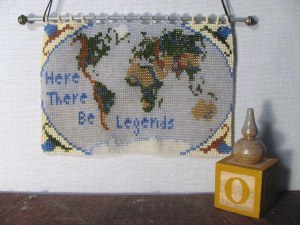
My own venture in mapmaking
I am far behind on writing reviews for things that I’ve read, I know. But here I am, finally getting around to writing the review for The Mapmakers by John Noble Wilford.
It was long. I’m not sure if that’s because I kept having to scrounge for reading time, or if it’s because the writing was slow, but it felt like I’d been reading it forever. And, looking at the dates I clocked on Goodreads, it does look like it took me two months to read, so I pretty much was reading it forever.
The Mapmakers is a book about the history of maps and map making. It goes all the way back to prehistoric times, and talks about how maps long predate writing, and have been found carved (or painted) on rocks and shells and cave walls and who knows what from tens of thousands of years ago. Which is itself a very interesting fact, since I work with little kids, and there seems to be an assumption that they won’t understand maps, or that they have to be introduced to maps as an idea, and then guided to understanding them. But if mapping predates writing, it’s probably more instinctive than anything. Although the kids I work with do seem to have some troubles with world maps, and keep asking if they live in Germany, or asserting that they live in Mongolia. So perhaps there is some guiding necessary there. But I want to make maps of the playground now, and…oh, but I think we’re a little off topic.
Right. Well, after pre-history, the book talked about how advanced maps were in China and the East, and then came back West and spoke almost exclusively about the Western traditions of mapmaking. Which, honestly, was pretty much what I’d expected, even if it was a bit disappointing.
Medieval maps were interesting because they weren’t intended to be a realistic representation of the world, but instead to be a philosophical interpretation of the layout of the world as created by god. So they don’t really make any geographical sense, but it gives a lot of insight into the way their minds worked.
And then as the world expanded with colonialism and the Age of Exploration, the maps slowly climbed out of philosophy and into reality, but not without a struggle, since there were hypothetical passages, waterways, islands, countries, and even continents, that remained on maps until embarrassingly late in the game.
As the history of mapping became more modern, there was also more information about the surveyors and the mappers themselves, as well as their techniques, and that was interesting to learn about; the struggles they went through, the people they were, and so forth.
It was also interesting to learn about the slow progress of mapping, and how it advanced in fits and starts, and how there were maps from each stage. That was interesting in terms of world-building ideas, since we as authors, almost always assume that the maps our Fantasy characters use are completely accurate and perfect in scale and sense, when, really, given that slice of historical accuracy we all pretend to have, they shouldn’t be.
And I, for one, would not object to more fantasy novels that were about things like mapping the world (through the forest of the Elves, and past the Ice Wyrms, looking for the Mystical City of El Dorantis-La, for example), rather than saving the world from The Biggest Evil EVAR, OMG.
So I enjoyed that much of The Mapmakers. Otherwise, a lot of words were spent talking about the different possible layouts of maps, and how they are mathematically imperfect to illustrate a 3-d almost-sphere on a flat sheet of paper, and other such things. I am not half-bad at math, but I couldn’t follow what he was talking about in the more technical sections, not beyond the very basics, anyway. Same with some of the descriptions of more advanced techniques. Sometimes it just felt like I’d understand if there were a few more illustrations, and other times I just started skimming because there was no way I’d ever get it, unless I was already a mapmaker, probably.
And then the last few chapters were about the changes technology were making to mapping. Which is great, except that this book was written in the early 2000s, you know, before Google Earth and Google Street View existed. Before we landed Curiosity on Mars. Before they launched New Horizons off to map Pluto. So it just all felt really, extremely outdated, and I skipped those chapters, too.
In conclusion…I don’t know. The topic was interesting, and there was lots of information for general purpose or for world-building, but there were also a lot of uninteresting parts to the book, so I’m not sure I’d recommend reading it. I wouldn’t advise against it, but I’d maybe suggest looking into other books on the topic, and seeing if those have better ratings for the layperson to read.


June 29, 2015
SSBB #55 Guys and Balls
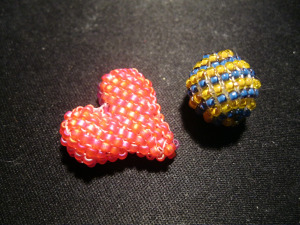
Something like this
I think this has maybe been the longest it’s ever taken me to read a single issue of Shousetsu Bang*Bang. But I’ve been busy. And better late than never, right?
A beginner’s guide to stealing home, by Hyakunichisou: This one was about a knitter! Balls of yarn! Which I appreciated, as a knitter myself. It was a sweet piece about the sort of fling that’s just a fling, but hits at the right moment to change your whole outlook on life.
The Ultimate Competition (or the art of beating your rival), by Okamoto Shin: In two parts. Two track rivals (with a Mysterious Past) from high school end up at the same college, where they have to learn to get along for the good of the team. Some nice, tasty UST, here.
True North, by SeishinNoUwagi: This was a fascinating tale about the ball game that the pre-Colombian cultures played, from the point of view of the sacrificial players. It was intermixed with (altered) folk-lore and myth, and it was a really fantastic piece, IMHO.
The Hail Mary, by Takiguchi Aiko: A famous football player’s agent calls his ex about a non-disclosure agreement, and the fallout thereof.
The Hidden Play, by Domashita Romero: A guy, at a ball, of the dancing sort, which is in honor of his ex’s betrothal (to someone else, obvs). The guy complains to a guard, and they …attempt to be a scandal. It was alright, but mostly smut, so I mostly skimmed it.
You Wanted Love But I Wanted You, by Lola Mente: In two parts. The god of overdosing and shadows tries to escape his fate, which means he’s avoiding the god of light and poetry. Beautifully executed, if a bit lacking in clear explanations. Not in a bad way, more like in a world-building sort of cock-tease way.
The Breathing Lessons, by shukyou: Two parts. I’m glad the main character made sense of his world and story because I never did. Although, granted, I was really tired when I read it. But the MC is trying to learn to breathe some sort of liquid so he can play a ball game like his father did, but not because his father did, while slowly falling in love with …uh…his…coach?
Open Top Bus Parade, by M. hoppipolla: A guy identifies his childhood football (soccer?) idol working at a cafe. They go on a date, and things progress, but not without a wrench or two. It was a sweet premise, but all the details were over-explained and I never quite got drawn in.
Make It Work, by loveonthefarm: Two parts again. A nice dessert tale of two guys on a volleyball team, who might be assholes, and who might hate each other, or who might really like each other, if only they bothered to talk to each other.


June 10, 2015
The Five Brothers of Everan
Hey, remember the Don’t Read in the Closet Event? What was it this year? Love Is An Open Road? Honestly I’m not reading the stories yet, but you may also recall that I personally submitted a story request! And while the author who chose it was one that I was merely lukewarm about last year, I was excited when I saw that it was up already, so I figured I’d take a break from The Mapmakers and give it a go.
But between my Expectations, and the fact that I already knew I didn’t love the author, there was pretty much no way that I was going to like this story.
And I don’t.
It’s not bad, per se, it’s just…not really good. I’m still lukewarm on the author’s style (there was a comment somewhere about last year’s story being very unusual for her, so I hoped, but no), and I am having a really hard time adjusting to the fact that I agonized over making my “dear author” letter so that it should inspire hilarity and shenanigans, with a minimum of angsting, but the author apparently missed all of that and wrote a dull story of a whiny prince with brothers whom he doesn’t seem to like much, a council with too much control, and serious concerns over the king’s continued health.
It’s so different from what I wanted that I have to pretend that it wasn’t my suggestion that inspired it in the first place, but then, it’s so mediocre that if I’m not reading it because it’s “my” story, then I would not, in fact, be reading it.
So I stopped about half-way.
And of course, now I feel like an utter asshole, because here is someone who took a gift of inspiration, and made something that they were entirely free to make with it (and which I’m sure will acquire its own fans), and yet I’m bitching about it on my blog (which, yes, mostly no one reads) because it wasn’t exactly what I expected them to do with it. And also does not align with the idea I had in my head for the story. Not even a little.
I suppose I could have not fleshed out tidbits of it in my head already, thereby limiting my expectations, but I doubt I could have made the initial ‘letter’ if I hadn’t at least a minimal concept of what I wanted it to look like. I don’t know that I’ve ever thought of a story idea, and not immediately shuffled together at least two chapters worth of stuff for it. I never write that shit down, but it exists in my head.
And I spent a long time looking for a picture of a prince who was not overtly a knight or a mage (picture says ‘scholar’ to me), but I guess I needn’t have bothered, since the prince is a mage. Next time I’m going with the first picture that’s at all genre-related and then throwing words at the screen. Maybe I’ll use the predictive-text suggestions, even. Then I won’t be attached to the resulting inspiration letter, and my Expectations may be more in line with reality.
But I still feel bad for hacking on the story, so I’m not going to link it.


May 29, 2015
Their Name is Today by Johann Christoph Arnold
Hi! So… I haven’t been avoiding you, and I haven’t fallen off the face of the earth, either. I’ve just been busy pretending I have a life that doesn’t involve knitting socks (much), and therefore I’ve not had much time to read. I have been slowly wading my way through one book about the history of mapmaking, but I had to take a break from it to read this other book as part of my continuing ed for work.
Well, I guess I didn’t *have* to, but they are offering ice cream at the book discussion.
And let me just say that it had better be some DAMN GOOD ICE CREAM.
The book is by Johann Christoph Arnold, and it is. Well. It is.
As you can imagine this is a book about children, or rather, about caring for the precious little angels that God sent to you to remind you of all the joy that exists in life. But not in so many words, because this book pretends to reach all audiences. It even references Muslim families and their childcare practices! You can’t get much more open-minded than that in this day and age.
Now, it’s not all bad. The book talks about how we should limit screen time of small children, and that we should seek to spend more time with them as parents and as teachers, and it spends an acceptable amount of time bitching about how the government and Testing is all up in our schools ruining everything. And I’m for all of those. To an extent.
What I’m not for is blaming video games for all violence and school shootings, which this book totally and flat-out does. I’m also completely opposed to people who state that children are the worst affected by a divorce, and so parents should stay together “for the children” if nothing else (which studies and common sense both have proven untrue).
It talked about the effects The Media has on children, but didn’t really come off too strongly in support of non-traditional gender roles. Actually, it was almost obsessively in favor of a stay-at-home parent. Of a wedded two-family home. Which presumably consists of a hetero-normal couple.
I mean, the book told us, it’s okay for a parent to divorce, and maybe that kid will even turn out okay, but it really is better for them–for the CHILD to stay together. Please, think of the child. When you promise forever with your wedding vows, you make that promise to your children (who were preferably not around at the event?), and so divorcing your (abusive? assholish? deadbeat?) husband (wife?) means breaking that promise; and if you want your children to grow up to be strong and faithful, than YOU need to be strong and faithful.
You fucking hussy. Your kid learns to dress like a slut from you, by the way.
Well, from the way you dress and the fact that you don’t discipline them enough. Or play with them at all. You should have your nose all up in their pie. But don’t smother them.
Smothering means they never figure out how to fail, and then they crash and burn at getting their first C+. Become suicidal, and turn to video games. Next thing you know your kid will be a school shooter!
All of this chock-full of personal anecdotes from his life of being one of eight children, and/or being a parent of …I don’t know, probably eight more, heart-wrenching quotes from his grandfather, and other stories drawn from people “of all walks of life.” Which I put in quotes, because those quotes were all pretty cherry-picked to support his view of things.
I could go on. In fact, I think I will go on. The book talked about how the child-parent bond is a magical, mystical thing that can overcome any and all adversity, without really acknowledging that it’s just another fucking relationship, and the only thing mystical about it is that society won’t let us let it go, even when it’s toxic to us emotionally. Yeah, it can be great, but it has to have a great person on either end of it, just like any great friendship or relationship. You have mediocre people parenting, no amount of play time in the world is gonna fix that.
And video games! I know the whole media type has a bad rap, and I know how and why it has that rap (and that it’s not totally undeserved), but VIDEO GAMES ARE NOT THE ROOT OF ALL EVIL. THEY DO NOT TURN CHILDREN INTO SHOOTERS. CORRELATION, NOT CAUSATION, DUMBASS. Yes, limit scree-games, yes, limit TV, yes, pay attention to what’s in those shows you let your kid watch, yes, encourage outside play. But DO NOT think that one mediocre form of story-telling is going to turn your kid into a killer.
I just…this whole book, I’d be nodding along with one point, and then the next one would garner a look of absolute horror and disgust. This is the sort of crap that leads to the breast-feeding insanity on the internet. Leads to parents judging other parents. Leads to ranting against New Media, limiting your child’s interaction with real society (which does mostly exist online today), and probably that leads, eventually to all that anti-vax BS.
OH GOD, I have to care for my child as my primary job, like they used to do! I have to make my kid play outside like they used to do! I have to school my child at home like they used to do! I have to isolate my child from violence and keep them innocent like they used to do! I have to feed my kid a paleo diet like they used to do! So…I had better just not vaccinate my kid like they used to do!
After all, the life of a child who lived only a short time in this world is truly blessed, for they will have touched the most lives, and given all those lives they touched a chance to reflect on their own mortality and purpose here in life.
Oh, look, I could have written this book, too.
I don’t know what I’m going to do at this discussion session. I’ll probably bite my tongue, because I doubt I’ll be in like-minded company. And I’m not sure I want to explain to a room full of oldish childcare teachers why it’s so awful.




